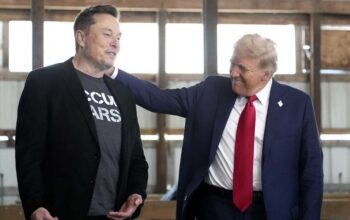@khuntercourant
The inauguration of President Joe Biden means that much will change regarding how the COVID-19 pandemic is handled. Biden vows to respond to the pandemic “based on science, not politics”.
During the first days of his presidency, Biden has shown initiative in halting the spread of COVID-19, signing several executive bills. Biden rejoined the World Health Organization (WHO) and has implemented a mask requirement and social distancing mandate on federal property and for government officials. He has challenged Americans to wear a mask for the first 100 days of his presidency. He claims, by April, this could save 50,000 lives. Biden has also asked that all governors make masks mandatory in their states.
Biden and his administration are focusing on making COVID-19 testing and vaccines more accessible. He wants to double the number of testing sites, provide clear, consistent, national guidance based on science, and better the deployment and operation of necessary supplies, personnel, and facilities.
Biden’s COVID-19 approach reflects his belief that health care should be available to everyone. He wants to ensure that there is an equal distribution of treatment regardless of social class. In other words, he wants testing and vaccines to be available to all.
Biden is pushing for a COVID-19 stimulus package which includes 1.9 trillion dollars economic relief. Twenty million dollars of this bill will be set aside for a national vaccine center that will drastically increase the number of vaccination sites available. Fifty million dollars will be set aside to increase the availability of COVID-19 testing and allow for the employment of 100,000 public health workers.
In addition to stopping the spread of the virus, a large part of Biden’s bill focuses on trying to soften the financial blow this pandemic has caused for many working Americans. This bill is intended to provide support for newly jobless Americans.

It will provide 400 dollars weekly, a 100 dollars weekly improvement from the relief bill Congress passed in December. Biden is trying to make these weekly payments last through September, instead of the eleven weeks in the December package. Biden’s plan will also cover a fifteen-percent increase in food stamps lasting through September rather than June. It will give one billion dollars to U.S. territories.
This plan also gives fifteen million dollars in support to a program to assist child care providers and family child care homes. These funds will cover rent, payroll, utilities, and COVID-19 protective equipment.
Biden hopes to enforce a fifteen dollar minimum wage to help minimum wage workers support themselves, especially during this time.
Since small businesses and their employees were hit the hardest by the pandemic, Biden’s plan will implement further support that specifically targets these groups. He is providing a fifteen billion dollar grant plan to support small businesses. This will serve in addition to the already formed Paycheck Protection Program.
Biden wants to provide 350 billion dollars to state governments to keep their frontline workers employed, facilitate the spread of the vaccine, help run COVID testing, and open schools. Biden wants to set aside 170 billion dollars for kindergarten through twelfth-grade schools. This is a substantial increase from the 82 billion dollars approved in December.
Additionally, due to COVID-19 related concerns, public transportation has taken an economic hit. People aren’t taking vacations and most daily commuters are working from home. Because of this significant impact, twenty billion dollars will go to public transit. This will help reduce layoffs and prevent companies from cutting off routes.
Biden’s proposal implements many changes to the previous plan of the Trump administration. Biden hopes that if this plan is passed, it will bring a degree of financial security, preserve small businesses, and slow the national spread of this deadly virus.




